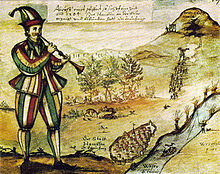
Hamelin (German: Hameln) is a town in Lower Saxony, 50 km southwest of Hanover. It is the scene of the Pied Piper story (German: Rattenfänger von Hameln), about the man who expelled rats from the town by playing the pipe, and then abducted the town's children when the citizenry refused to pay him what they had agreed. The town is visited by some three million visitors each year and is easy to reach from Hannover by train (S-Bahn).
Get in
editBy airplane
editThe nearest airport and high-speed train station are in Hanover. From there you may transfer to Hamelin thrice an hour using suburban line S5 or S51 in 40–45 minutes.
By train
editSince the year 2000, the S-Train Lines S 5 and S 51 have offered connections every half hour from Hannover's train station. Likewise, since 2002 hourly connections to Paderborn have been available. Every hour connections to the Bünde-Löhne-Rinteln-Hameln-Elze-Hildesheim route are available via the "Weser train" (line RB 77).
On foot
editThe European far-distance hiking trail E11 passes through Hamelin on its way from the Netherlands, Osnabrück and the Porta Westfalica, continuing to the Harz mountains and Berlin.
Get around
editSee
edit

- Several romantic 16th-century half-timbered houses with lavish ornaments, e.g. Stiftsherrenhaus (canons' house) and Bürgerhaus (house of the citizenry)
- 1 Pied Piper's House (Rattenfängerhaus), Osterstraße/Bungelosenstraße. Renaissance building from 1602/03, with an elaborately decorated main façade and an inscription reminding of the Pied Piper legend.
- 2 Hochzeitshaus. Renaissance-style sandstone building dating from 1610–17. Pied Piper-themed carillon.
- 3 Schloß Bückeburg and Hofreitschule, Fürstliche Schlossverwaltung Schlossplatz 1 31675 Bückeburg, ☏ +49 5722 9558-30, info@schloss-bueckeburg.de. Castle and riding school/horse stables. Very beautiful and elegant. Tours available in English
- 4 Site of the Nazi Reich's 1933-1937 Erntedankfesten. Interesting for history fans, to see the site where the Nazis celebrated their harvest festivals, on the Bückeberg hillside. To get to the top requires quite a few stairs, but the views and historical value are rewarding. Free.
Churches
edit- Garrison Church.
- St. Boniface Minster Church.
- Market Church of St. Nicholas.
Museums
edit- 5 Hamelin Museum, Osterstraße 8-9, ☏ +49 5151 202 1215. Tu-Su 11:00-18:00. Museum of local history in two neighbouring historic buildings (Renaissance-style sandstone Leisthaus and half-timbered Stiftsherrenhaus) Adult €5, child (6-17) €3.
Do
edit- Weser Cycle Route. A bike path named one of the most beautiful and scenic rides in all of Germany.
Buy
editEat
editBudget
editMid-range
edit- 11 IndiaHaus im Rattenfängerhaus (Pied Piper's House), Osterstr. 28, ☏ +49 5151-3888. One of the more famous buildings in Hameln's old-town area. A beautiful example of the architectural style of the Weser Renaissance.
- 12 Tündernsche Warte, Tündernsche Warte 1, ☏ +49 5151 92 47 04. Lovely little restaurant and beer garden a short bit away from the bustle of the main town and city centre.
- 13 Grimsehls Handwerk, Bäckerstraße 46.
- 14 Pfannekuchen Hameln, Hummenstraße 12.
- 15 Café am Ring, 164er Ring 1.
Splurge
editDrink
editSleep
edit- 1 Jugendherberge Hameln, Fischbecker Str. 33, ☏ +49 51 51 34 25, jh-hameln@djh-hannover.de.
- 2 Hotel Christinenhof, Alte Marktstr. 18.
- 3 Hotel Jugendstil, Wettorstr. 15.
Nearby
edit
- 6 Hämelschenburg (12 km south of Hamelin; Bus 40 from Hamelin central bus station to "Hämelschenburg Schloss" (30 minutes)). Renaissance-style sandstone chateau in the Weser Uplands, one of the best examples of Weser Renaissance architecture, housing an art collection, surrounded by an ensemble of gardens, church, outbuildings and a watermill.
Go next
edit- Hanover, state capital, 50 km northeast (40–45 minutes by train)
- Hildesheim, historical city with several medieval cultural monuments, 50 km east (50 minutes by train)
- Lemgo, extraordinarily well-preserved old town with many medieval and Renaissance merchant's houses, 40 km west
- Detmold, with the iconic Hermann's monument, 45 km west
- Bodenwerder, origin city of the Baron von Münchausen legends, namesake of Munchausen syndrome, with entertaining statues throughout the town commemorating the myths

